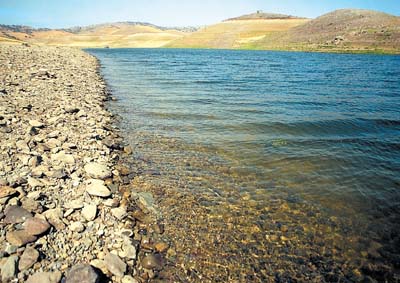A cold classroom was the venue for something momentous and
obscure Sunday evening: 15 scientists gathered from around the
country to help solve the Delta’s environmental problems.
A cold classroom was the venue for something momentous and obscure Sunday evening: 15 scientists gathered from around the country to help solve the Delta’s environmental problems.
The independent panel appointed by the National Academy of Sciences officially begins its work this week, with a series of meetings on the University of California, Davis, campus through Thursday.
The review starts under a cloud of doubt following media reports that the panel’s formation can be attributed, at least in part, to the influence of farmers who depend on water exported from the Sacramento-San Joaquin Delta.
“I think there’s been too much news generated about our activities and we haven’t even started,” said Stephen Parker, director of water and science programs at the National Research Council, which oversees the panel.
It’s a politically charged time in California water issues, as diversions from the Delta have already been reduced by a three-year drought. Farms and cities that depend on that water have objected to the water limits imposed by federal wildlife agencies, and their politicians have pressed federal wildlife agencies to loosen the rules that protect salmon, Delta smelt and other imperiled fish.
Illustrating this pressure, the Pacific Legal Foundation, a conservative nonprofit law firm based in Sacramento, used the event to announce a new federal lawsuit against Endangered Species Act protections for the smelt.
On behalf of three San Joaquin Valley farmers, the group claims the rules violate the Constitution because the smelt has no role in interstate commerce. The group recently lost a similar claim in federal District Court in Fresno and is now appealing.
“We brought this lawsuit not just on behalf of our particular clients, but on behalf of the entire San Joaquin Valley,” said foundation attorney Brandon Middleton. “This case could end up being appealed all the way to the U.S. Supreme Court.”
Once the meeting began, Rep. Jim Costa of Fresno got the first opportunity to speak as a witness before the panel. Costa, a conservative Democrat, told the panel the fish protections have harmed his constituents and are based on “flawed science.”
“The social and economic devastation has been real, and awful,” Costa said.
He did not mention that the fish protections reduced water exports from the Delta about 10 percent last year, according to state and federal water officials. The drought caused cuts twice as large.
Costa was allotted 20 minutes but took nearly an hour. Jeffrey Mount, a geologist and scientific expert on the Delta, was the next witness and had to compress his hourlong presentation into 30 minutes.
Mount told the panel, as he revealed in The Bee on Thursday, that he is concerned the National Academy of Sciences is not the right body to review the federal fish protections. It is a pure science entity, whereas the rules are somewhat political.
“The political and legal realities ensure that this review will have a powerful effect,” said Mount, a UC Davis professor. “That is something you need to keep in mind.”
He urged the panel to embrace a simple task: “sustainability” as it applies to the Delta.
His charge encompasses much of the fight over the Delta. Some wish to return it to a pristine state. Others simply want to take all the water they can get from it.
Mount said no one has yet defined a sustainable middle ground.









